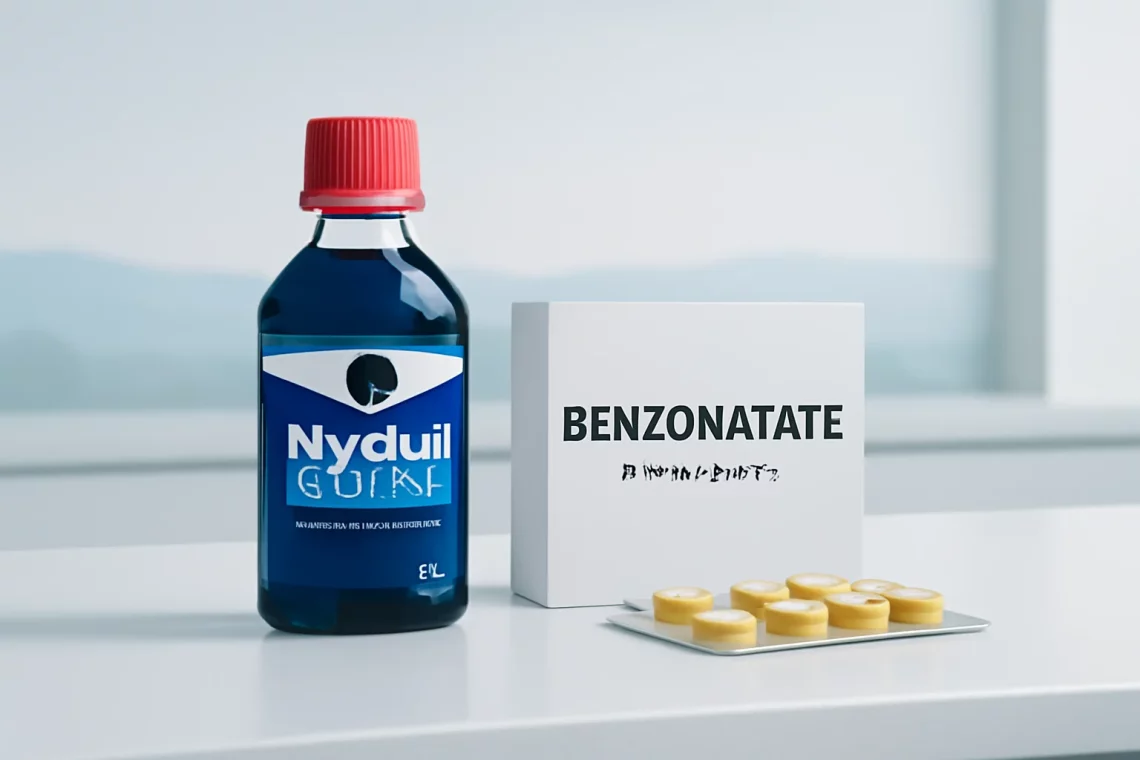
Benzonatate vs NyQuil: Which Cough Remedy Is Right for You?
The struggle with coughs and colds is a common experience, especially during seasonal changes. As people seek relief from these uncomfortable symptoms, various medications become popular choices. Among them, Benzonatate and NyQuil have garnered attention for their effectiveness in alleviating cough and cold symptoms. However, understanding their differences, uses, and potential side effects is essential for making informed decisions about which medication might be more suitable for individual needs.
Benzonatate is a prescription medication that specifically targets cough suppression. It works by numbing the throat and lungs, reducing the urge to cough. On the other hand, NyQuil is an over-the-counter medication that offers a combination of ingredients designed to address multiple symptoms associated with colds and flu, including cough, runny nose, and fever. While both medications aim to provide relief, their mechanisms of action and intended uses differ significantly. This article will delve deeper into the characteristics of Benzonatate and NyQuil, helping readers navigate their options when it comes to managing cough and cold symptoms.
Benzonatate: Uses and Mechanism of Action
Benzonatate is an oral medication classified as a cough suppressant. Its primary function is to alleviate coughing by acting on the sensory nerves in the lungs and airways. When taken, Benzonatate numbs these areas, which decreases the cough reflex and provides relief from persistent coughing. This makes it particularly beneficial for individuals experiencing a dry cough, which can be bothersome and disruptive.
One of the key advantages of Benzonatate is that it specifically targets cough without addressing other cold symptoms like nasal congestion or fever. This focused action makes it an ideal option for those whose primary concern is to control their cough, especially when it is non-productive and does not serve a significant purpose in clearing mucus from the airways.
Benzonatate is available in soft gel capsules and should be taken as directed by a healthcare professional. It’s essential to swallow the capsules whole, as chewing or dissolving them can lead to a numbing sensation in the mouth and throat, which could be uncomfortable or even dangerous.
As with any medication, there are potential side effects to consider. Common side effects of Benzonatate may include drowsiness, dizziness, headache, and gastrointestinal issues such as nausea or constipation. Although serious side effects are rare, allergic reactions can occur, which may manifest as rash, itching, or difficulty breathing. It is crucial for individuals to discuss their medical history and any other medications they are taking with their healthcare provider to avoid potential interactions and ensure the safe use of Benzonatate.
In conclusion, Benzonatate serves as a targeted approach to cough suppression, making it an effective choice for individuals looking to manage a persistent cough without addressing other cold symptoms.
NyQuil: An Overview of Its Ingredients and Uses
NyQuil is a well-known over-the-counter medication designed to provide relief from multiple symptoms associated with colds and flu. Unlike Benzonatate, NyQuil combines several active ingredients to address a range of discomforts. Typically, NyQuil contains an antihistamine, a pain reliever, and a cough suppressant, allowing it to tackle symptoms such as cough, nasal congestion, runny nose, headache, and body aches.
The most common formulation of NyQuil includes diphenhydramine, acetaminophen, and dextromethorphan. Diphenhydramine is an antihistamine that helps relieve runny nose and sneezing while also providing a sedative effect, which can be beneficial for those struggling to sleep due to cold symptoms. Acetaminophen serves as a pain reliever and fever reducer, making it effective for alleviating discomfort associated with colds and flu. Dextromethorphan acts as a cough suppressant, similar to Benzonatate, but it works in a different way by affecting the signals in the brain that trigger the cough reflex.
The broad-spectrum approach of NyQuil makes it appealing to those who are experiencing multiple symptoms at once. It is often taken at nighttime due to its sedative properties, which can help individuals rest better while battling illness. However, it’s important to note that the sedative effects can vary from person to person, and some individuals may experience drowsiness after taking NyQuil during the day.
While NyQuil is generally considered safe for most people, it is not without potential side effects. Common side effects may include drowsiness, dizziness, dry mouth, and gastrointestinal discomfort. Additionally, because NyQuil contains acetaminophen, it is crucial to monitor total daily intake to avoid exceeding recommended dosages, as this can lead to serious liver damage.
In summary, NyQuil offers a multi-symptom relief option for those suffering from colds and flu. Its combination of ingredients makes it effective for alleviating a range of discomforts, but users should be mindful of potential side effects and interactions with other medications.
Comparing Effectiveness: Benzonatate vs NyQuil
When it comes to choosing between Benzonatate and NyQuil, effectiveness largely depends on the specific symptoms an individual is experiencing. Benzonatate is highly effective for controlling persistent, dry coughs, particularly when they interfere with daily activities or sleep. Its targeted action makes it a suitable choice for those who do not have other cold symptoms that require management.
In contrast, NyQuil excels in providing comprehensive relief for multiple cold symptoms, making it a go-to option for individuals who are experiencing a cluster of symptoms including cough, fever, and congestion. For those who need help sleeping through a cold, NyQuil’s sedative effects can be particularly beneficial.
Another factor to consider is the duration of use. Benzonatate is typically prescribed for short-term use due to its specific action on cough suppression. In contrast, NyQuil can be used for several consecutive nights to manage symptoms, as long as users remain mindful of the dosage and potential side effects.
Ultimately, the decision between Benzonatate and NyQuil should be informed by individual symptoms and preferences. Some people may choose to use both medications at different times, depending on their needs. For example, a person experiencing a persistent cough during the day may opt for Benzonatate to suppress it, while turning to NyQuil at night to address multiple symptoms and promote restful sleep.
Consultation with a healthcare professional can provide additional guidance, ensuring that individuals select the most appropriate medication based on their specific health circumstances and symptomatology.
Safety and Considerations for Use
Both Benzonatate and NyQuil are effective medications, but they come with safety considerations that users should be aware of. Understanding these factors can help prevent adverse effects and ensure safe usage.
For Benzonatate, it is essential to follow the prescribed dosage and instructions. Overdosing on Benzonatate can lead to severe side effects, including confusion, hallucinations, and even cardiovascular collapse in extreme cases. Individuals should also be cautious about sharing this medication; it is not suitable for everyone, particularly those with certain medical conditions or those taking specific medications.
On the other hand, NyQuil’s safety considerations revolve primarily around its ingredients. Because it contains acetaminophen, users should ensure they do not take other medications containing this ingredient to avoid unintentional overdose. Additionally, individuals with liver disease, heavy alcohol consumption habits, or those who are pregnant or breastfeeding should consult a healthcare provider before using NyQuil.
Furthermore, both medications can cause drowsiness, so individuals should avoid driving or operating heavy machinery after taking them. Users should also be aware of potential allergic reactions; if any unusual symptoms occur after taking either medication, it is crucial to seek medical attention.
In conclusion, while both Benzonatate and NyQuil serve their purposes in providing relief from cough and cold symptoms, it is vital to use them responsibly and under guidance, especially when considering personal health conditions and other medications.
**Disclaimer**: This article is not intended as medical advice. Always consult a healthcare professional for medical concerns or questions regarding medications.




